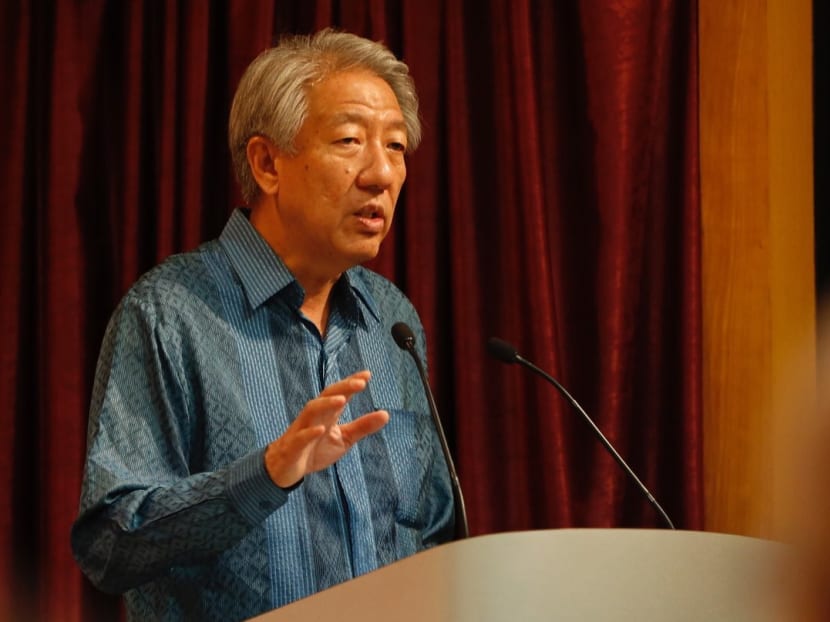Five questions on the first Singaporean woman detained for radicalism
SINGAPORE — The authorities announced on Monday (June 12) that Syaikhah Izzah Zahrah Al Ansari, a 22-year-old infant care assistant, had been detained under the Internal Security Act for trying to join the Islamic State (IS) in Syria. She is the first woman here to be detained for radicalism. TODAY speaks to four experts about the implications and questions raised by this case.

Deputy Prime Minister Teo Hee Hean speaking at the annual Iftar organised by Khadijah Mosque and Religious Rehabilitation Group. Photo: Nadarajan Rajendran/TODAY
SINGAPORE — The authorities announced on Monday (June 12) that Syaikhah Izzah Zahrah Al Ansari, a 22-year-old infant care assistant, had been detained under the Internal Security Act for trying to join the Islamic State (IS) in Syria. She is the first woman here to be detained for radicalism. TODAY speaks to four experts about the implications and questions raised by this case.
1. The vast majority of Singaporeans detained for radicalism are men. Are there specific cultural or societal reasons that make radicalism among women a rare phenomenon?
The experts say this trend is consistent with developments elsewhere around the world, due in large part to the recruitment emphasis by IS for male fighters to join the battlefield. While the militant group has also encouraged women to take up arms, IS has thus far mostly ascribed them supporting roles or as wives of the fighters.
"Unlike men who have clear fighting roles, the role of women is quite new and still evolving (in IS). It is for this reason that we see fewer women involved," said Mr Jasminder Singh, a senior analyst with the International Centre for Political Violence and Terrorism Research at the S. Rajaratnam School of International Studies (RSIS).
Added Dr Graham Ong-Webb, a research fellow at RSIS who studies Singapore’s national security strategy: "We have to consider that the psychological and societal threshold to cross for leaving behind your family and country, in the hopes of transplanting yourself to join a militant cause overseas, is likely to be lower for men than for women due to the different expectations we set upon them."
2. Is Izzah the "tip of the iceberg", or just a rare occurrence that the authorities successfully spotted?
Experts who spoke to TODAY are divided on this question, with three of the four agreeing that Izzah's radicalisation is a rare, if not isolated, case. "The causes and triggers are very granular, in short personal to the beholder," said Mr Singh.
Dr Ong-Webb, however, said "no one can say for sure", adding: "At this point, nobody can say that Izzah’s case is just a one-off situation, until we get more data through on-the-ground intelligence, research, and even public surveys."
Mr Singh and Dr Ong-Webb, however, agreed that Izzah's case presented an important learning experience for the authorities, on how the problem of self-radicalisation is evolving.
"There is a race for the state and its agencies to be ahead of the curve all the time. As a small state, the extremists only need to be successful once but we have to be successful all the time in neutralising them for the safety of our society," said Mr Singh.
3. What impact, if any, might this first case have?
Again, the experts are divided on this issue. "I do not think there will be a large impact per se, but I think it will ignite a dialogue on whether groups like the Religious Rehabilitation Group have been targeting the right people," said Mr Ridzwan Rahmat, a senior defence and security analyst at Jane’s, a British defence consultancy and publisher.
The most significant impact from this first case, Mr Singh added, is in driving home the message that no one is immune from potential self-radicalisation and that the notion of a Singaporean woman radical is not unthinkable.
4. Do men and women fall prey to radicalisation differently?
A majority of the experts agree on this, pointing to how IS tries to appeal to men and women differently.
"A person is radicalised through a confluence of many reasons that include social marginalisation and gender-based expectations that are bound to impact men and women differently," said Dr Ong-Webb.
5. How would Izzah's case change how the Singapore authorities approach their monitoring of suspected self-radicalised individuals?
The experts are unanimous in saying that this first case will prompt some rethink on the authorities' part.
"I think there has to be a lot more emphasis on electronic monitoring and intelligence, including on social media channels, as compared to in the past when authorities relied mainly on human intelligence," said Mr Rahmat. "Self-radicalised individuals are difficult to spot by intelligence operatives as they do not necessarily hang out in congregations or mosques, and they behave just like everyone else in public.
Mr Ahmad El-Muhammady, an advisor to the Royal Malaysia Police's rehabilitation programme for terrorist detainees, added that he expected new policies and laws to be introduced to strengthen surveillance of militancy in Singapore.
Both Dr Ong-Webb and Mr Singh stressed the important role that family members play in this endeavor.
Mr Singh said: "Without the support of the family and community, this war can never be won. The first respondent, that is, the first people who can identify a change in an individual’s behaviour, is the family.
"If the family and the wider community does not support the state’s attempt at countering radicalisation, this will be an endless war. What is critical, as highlighted by this case, is the need to heighten the partnership between the state, community and family."






